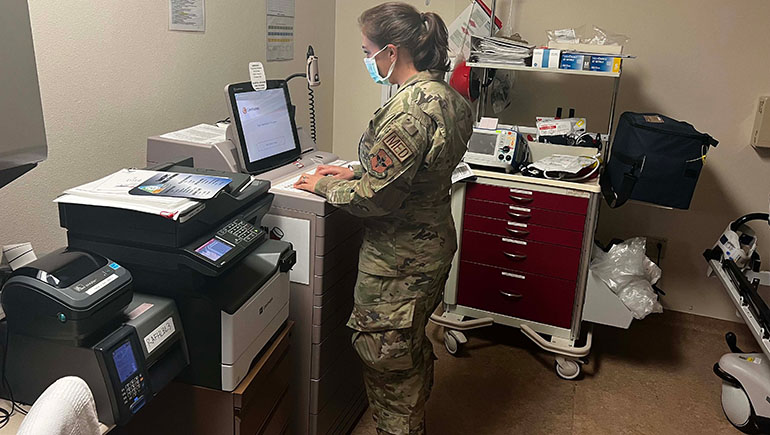
Air Force Capt. Courtney Ebeling always knew that she wanted to eventually follow in her parents’ footsteps and join the military.
Soon after she completed nursing school and got married in her hometown of Rapid City, South Dakota, she began the process to become a commissioned officer in the Air Force while working as a civilian nurse. But as life happens, she learned that she was pregnant, putting her military plans on hold.
She continued to work as a civilian contract nurse at the military clinic in Mountain Home Air Force Base, in Idaho, but her desire to serve in uniform persisted. Four years later, she was commissioned into the Nurse Corps at the rank of first lieutenant.
“Like most nurses, I feel like I like to help people,” she said.
She said nursing allows you to always move on to something new, do something different, change specialties. “There’s so much opportunity with a nursing degree that you’re never bored on the job.”
“There are nurses that are generals in the Air Force. So just the opportunities that are afforded to me, not only from my nursing degree, but from the Air Force, are just outstanding,” she says.
With a medical-surgical specialty, Ebeling is currently serving as a “general practitioner-type” of registered nurse at Joint Base San Antonio-Randolph Family Health ClinicJoint Base San Antonio-Randolph Family Health Clinic website, Texas.
“Med-surg nurses can work on the floor, or in outpatient clinics, or urgent care.”
They provide care to adults who are preparing for or recovering from surgery. It is the largest nursing specialty in the United States.
Responding to COVID-19
Ebeling recalls the COVID-19 pandemic required a “massive effort” to change operations “practically overnight.” She and her team set up a drive-thru testing site at her clinic, while also continuing to care for their routine patients.
Then, in 2021, she deployed to Afghanistan.
“I was at Bagram, doing COVID testing, doing COVID vaccinations in Afghanistan for not only U.S. citizens and military service members, but also for all the contractors and all of the foreign military,” she said. “That was huge.”
In what she describes as a unique experience, Ebeling was part of the team standing down the operations at Bagram to prepare for the withdrawal of U.S. forces from Afghanistan in 2021.
Later, she deployed to Bangor, Maine, to support the civilian staff that was overwhelmed with “all the hospitalizations related to COVID.”
As a result, she’s had to adapt to many new and different scenarios.
Responding to the biggest pandemic in 100 years was a challenge, she says, because everything was new and required “amazing flexibility.”
“Trying to get processes in place – to make sure that we’re protecting our staff, the patients, and that the patients still have all the things that they need to stay healthy or to get healthy – is a lot,” she says.
“It’s a whole process that involves a ton of different people and a ton of different sections. And you have to think on the fly and be ready and open to try different things out.”
Coping
As a mother of two, Ebeling coped with the stress of the situation by taking breaks and spending time with her kids.
“Taking time away from work and purposefully disconnecting in my time off helped,” she recalled. “I spent time with my kids doing things outdoors, like hiking, camping, and playing sports.”
She also said she’s thankful for the military’s effort to support service members like her.
“The military does such a good job with putting leaders into the right places so that they can guide and direct the care, and giving individuals the ability to make actual changes,” she said.
“They do a good job of listening to everyone’s ideas. We can make suggestions that get heard by the right people to implement changes.”
